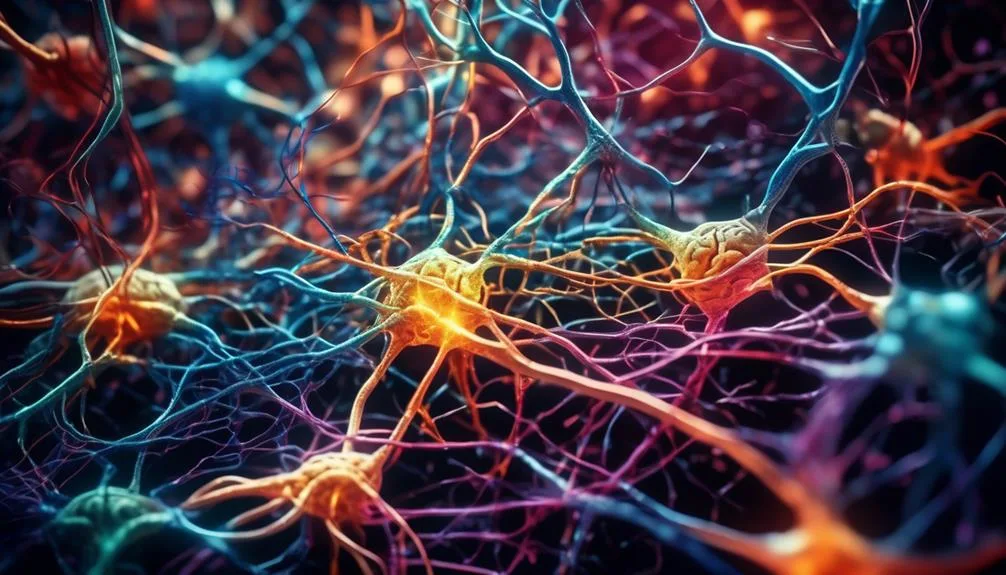Have you ever wondered what happens to the brain when someone practices meditation regularly?
Let's consider the case of John, a high-stressed executive who decided to incorporate meditation into his daily routine. Initially skeptical, John committed to a consistent meditation practice and soon began noticing a profound shift in his overall well-being. This transformation led him to wonder: could meditation actually rewire the brain?
In this discussion, we will explore the fascinating impact of meditation on neuroplasticity, uncovering how this ancient practice can reshape the very structure of our minds and unlock a wealth of benefits for personal growth and emotional resilience.
Key Takeaways
- Neuroplasticity refers to the brain's ability to change and adapt throughout life.
- Meditation enhances neuroplasticity, promoting the growth of new neural connections and strengthening existing pathways.
- Regular meditation practice has been shown to increase the volume of gray matter in certain brain regions.
- Mindfulness practices, including meditation, can enhance cognitive function, emotional well-being, and resilience in the face of adversity.
The Science Behind Neuroplasticity

The science behind neuroplasticity reveals the remarkable ability of the brain to reorganize and reshape its structure and function in response to experiences, learning, and meditation.
Neuroplasticity, also known as brain plasticity, refers to the brain's ability to change and adapt throughout life. This dynamic process involves the creation of new neural connections and the restructuring of existing ones.
Neuroplastic mechanisms, such as synaptic pruning, neurogenesis, and myelination, play crucial roles in this process. Synaptic pruning involves the elimination of unnecessary connections, while neurogenesis refers to the formation of new neurons. Myelination, on the other hand, involves the insulation of neural pathways to enhance signal transmission.
These mechanisms allow the brain to fine-tune its neural circuits in response to external stimuli and internal processes, ultimately shaping our thoughts, behaviors, and abilities.
Understanding the Brain's Ability to Change

After exploring the science behind neuroplasticity and its role in shaping the brain's structure and function, it's important to now delve into understanding the brain's remarkable ability to change and adapt.
The brain's ability to rewire itself, also known as neuroplasticity, is a fundamental characteristic that allows it to continuously learn, grow, and respond to new experiences. Here are four key points to understand about the brain's ability to change:
- Plasticity isn't limited to the early stages of life: Contrary to previous beliefs, the brain can undergo rewiring and adaptability throughout a person's lifespan.
- Neural connections can strengthen or weaken: The brain constantly adjusts its connections based on the frequency and intensity of neural activity. Connections that are frequently used become stronger, while those that are rarely used may weaken.
- Learning and experience shape the brain: Engaging in new activities, learning new skills, and exposing oneself to different environments can lead to changes in brain structure and function.
- Cultivating resilience is key: Resilience, the ability to bounce back from adversity, can be developed through intentional practices like meditation and mindfulness. These practices have been shown to promote neuroplasticity and enhance the brain's ability to adapt and recover from stress.
Understanding the brain's ability to change is crucial for unlocking its full potential and promoting personal growth and well-being. By actively engaging in activities that promote brain rewiring and cultivating resilience, individuals can harness the power of neuroplasticity to lead more fulfilling lives.
How Meditation Enhances Neuroplasticity

Meditation has been shown to enhance neuroplasticity, the brain's ability to change and rewire itself.
Through regular practice, meditation can promote the growth of new neural connections and strengthen existing ones, leading to increased neuroplasticity.
This enhanced neuroplasticity allows the brain to adapt and respond more effectively to various stimuli, ultimately improving cognitive function and overall well-being.
Neuroplasticity and Meditation
By engaging in regular meditation practice, you can enhance neuroplasticity, the brain's ability to reorganize and adapt its neural connections. Neuroplasticity research has shown that meditation has several beneficial effects on the brain's plasticity.
Here are four ways meditation enhances neuroplasticity:
- Strengthening neural connections: Meditation promotes the growth and strengthening of neural pathways, improving communication between different regions of the brain.
- Increasing gray matter: Studies have found that regular meditation can increase the volume of gray matter in certain brain regions associated with attention, emotional regulation, and self-awareness.
- Enhancing synaptic plasticity: Synaptic plasticity refers to the ability of synapses to change and adapt in response to experience. Meditation helps enhance this plasticity, facilitating learning and memory processes.
- Regulating the default mode network: The default mode network is a brain network involved in self-referential thinking. Meditation can help regulate this network, leading to improved focus, attention, and reduced rumination.
Brain Rewiring Through Meditation
Regular meditation practice can lead to the rewiring of the brain, enhancing its neuroplasticity. The brain's ability to reorganize and form new neural connections, known as brain plasticity, is crucial for learning, memory, and overall cognitive function. Through various meditation techniques, such as mindfulness and focused attention, individuals can actively reshape their brain's neural pathways.
| Meditation Technique | Description |
|---|---|
| Mindfulness | Involves paying attention to present moment experiences, thoughts, and emotions without judgment. This technique increases awareness and cognitive flexibility. |
| Loving-Kindness Meditation | Focuses on cultivating positive emotions and compassion towards oneself and others. This practice has been shown to enhance emotional regulation and empathy. |
| Transcendental Meditation | Involves silently repeating a mantra, allowing the mind to settle into a state of deep relaxation. This technique promotes a sense of calmness and reduces stress and anxiety. |
The Effects of Meditation on Brain Structure

The practice of meditation has been shown to have a significant impact on the structure of the brain. Here are four key effects of meditation on brain structure:
- Increased gray matter: Mindfulness practices have been found to increase the thickness of the prefrontal cortex, a region associated with attention, self-awareness, and emotional regulation. This expansion is thought to enhance cognitive function and emotional well-being.
- Strengthened connections: Meditation has been shown to increase the connectivity between different brain regions, particularly those involved in attention and sensory processing. This enhanced communication allows for improved cognitive abilities and a more integrated experience of the world.
- Reduced amygdala activity: The amygdala, responsible for generating fear and stress responses, tends to be less active in individuals who regularly practice meditation. This decrease in amygdala activity may contribute to decreased anxiety and improved emotional regulation.
- Enhanced hippocampus function: The hippocampus, crucial for learning and memory, has been found to be larger in experienced meditators. This suggests that meditation may support cognitive processes related to memory, learning, and spatial awareness.
Cultivating Emotional Resilience Through Meditation

Cultivating emotional resilience through meditation involves enhancing your emotional well-being and building inner strength. By regularly practicing meditation, you can develop the ability to regulate your emotions more effectively, leading to increased emotional stability and resilience in the face of adversity.
This process involves training your mind to observe and acknowledge your emotions without judgment, allowing you to respond to challenging situations with greater composure and resilience.
Enhancing Emotional Well-Being
Practicing meditation can enhance emotional well-being by strengthening emotional resilience. Here are four ways in which meditation cultivates emotional resilience:
- Improved emotional regulation:
Meditation helps you become more aware of your emotions and develop the ability to regulate them effectively. It allows you to observe your thoughts and feelings without judgment, enabling you to respond to them in a more balanced and constructive manner.
- Reduced stress and anxiety:
Regular meditation has been shown to reduce levels of stress hormones and decrease anxiety. By calming the mind and relaxing the body, it promotes a sense of inner peace and tranquility.
- Increased self-awareness:
Meditation fosters self-reflection and self-exploration, allowing you to gain a deeper understanding of your own emotions and triggers. This self-awareness empowers you to make conscious choices and respond to challenging situations with greater emotional stability.
- Enhanced mental health:
Numerous studies have found that meditation can alleviate symptoms of depression and improve overall mental well-being. By promoting a positive mindset and reducing rumination, meditation helps build resilience against negative emotions and enhances emotional well-being.
Building Inner Strength
Building inner strength through meditation involves developing emotional resilience and increasing your capacity to navigate and adapt to challenging situations. Meditation practices have been shown to cultivate inner peace and enhance mental resilience, enabling individuals to effectively cope with stress and adversity.
Through regular meditation practice, the brain undergoes neuroplastic changes that strengthen neural pathways associated with emotional regulation and cognitive flexibility. This leads to a greater ability to remain calm and centered in the face of difficulties, allowing for a more balanced and composed response.
Harnessing the Power of Neuroplasticity for Personal Growth

Harnessing the power of neuroplasticity for personal growth involves actively engaging in practices that promote the reshaping and strengthening of neural connections in the brain. By understanding and utilizing the brain's ability to change and adapt, you can make significant strides in your personal development journey.
Here are four key ways to harness the power of neuroplasticity for personal growth:
- Practicing mindfulness: Mindfulness meditation has been shown to positively impact neuroplasticity. Engaging in regular mindfulness practices can help you cultivate a focused and present mindset, enhancing your overall well-being.
- Adopting a growth mindset: Embracing a growth mindset, which believes that abilities and intelligence can be developed, encourages neuroplasticity. By viewing challenges as opportunities for growth, you can rewire your brain to embrace learning and personal development.
- Engaging in cognitive exercises: Regularly challenging your brain through cognitive exercises like puzzles, reading, and learning new skills can stimulate neuroplasticity. This helps improve cognitive function, memory, and overall mental agility.
- Seeking new experiences: Stepping out of your comfort zone and exposing yourself to new experiences can stimulate neuroplasticity. Trying new activities, exploring different environments, and meeting new people can help rewire your brain and expand your perspective.
Frequently Asked Questions
How Long Does It Take for Meditation to Start Affecting Neuroplasticity?
It takes time for meditation to start affecting neuroplasticity. The optimal duration for beginners is around 10-20 minutes per day. Long-term benefits include improved attention, emotional regulation, and cognitive abilities, while short-term effects can include reduced stress and increased relaxation.
Can Meditation Help With Specific Brain Disorders or Conditions?
Meditation has been studied for its potential benefits on specific brain disorders or conditions such as ADHD and anxiety. Research suggests that regular meditation practice may help reduce symptoms and improve overall well-being.
Are There Any Negative Side Effects of Meditation on Neuroplasticity?
There are no known negative side effects of meditation on neuroplasticity. In fact, research suggests that meditation can have positive effects on brain structure and function. However, it's always important to consult with a healthcare professional before starting any new practice.
Is There a Specific Type of Meditation That Is More Effective for Enhancing Neuroplasticity?
There is no specific type of meditation that has been proven to be more effective for enhancing neuroplasticity. However, different types of meditation may have varying impacts on overall brain health.
Can Neuroplasticity Be Enhanced Even Further by Combining Meditation With Other Practices or Therapies?
Combining meditation with other practices can enhance neuroplasticity. By exploring the role of mindfulness in neuroplasticity and brain health, you can further enhance the rewiring of your brain.
Conclusion
Congratulations, you've reached the end of this scientific exploration on the impact of meditation on neuroplasticity.
It's fascinating to think that by simply sitting in stillness and quieting the mind, you have the power to rewire your own brain.
Who'd have thought that the key to personal growth and emotional resilience lies within the depths of our own minds?
So, next time you find yourself in need of a change, remember the irony of it all – that the power to reshape your brain is just a few moments of meditation away.

